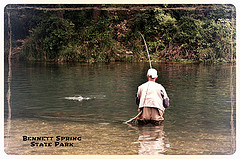 I stand hip-deep in a river, casting into the eddies. I am not the kind of man who routinely stands hip-deep in anything, but the kids are still asleep, and I need to pray somewhere—God knows—so here I stand. The water is frigid and it soothes my feet, sore from stumbling over stones to rescue my lure. All I’ve caught in this damned river are rocks.
I stand hip-deep in a river, casting into the eddies. I am not the kind of man who routinely stands hip-deep in anything, but the kids are still asleep, and I need to pray somewhere—God knows—so here I stand. The water is frigid and it soothes my feet, sore from stumbling over stones to rescue my lure. All I’ve caught in this damned river are rocks.
I’m here mostly to pray and because I want to fish in peace. Lord Jesus Christ—cast—son of God—lock—have mercy on me—reel, reel, reel—a sinner. In his last scene in The Godfather II, Fredo tells Michael Corleone’s son his fish-catching secret is to say a “Hail Mary” when he casts. Maybe that works for Catholics; this Orthodox Jesus Prayer is getting me nothing.
I am a tense and irritable man with occasional bouts of cheerfulness tempered by fatalism. I am a hard man with whom to live. I spent yesterday griping at my kids not to drown in the river, not to pick up snakes, not to fall into the fire pit. I pray and pray this morning.
Help me not to be a boulder hung from the necks of my children.
Let them not be lost. Come to them where they are.
Make them better than me.
My seven year-old strolls down the riverbank in his brother’s overlarge Crocs. He is clutching his little blue and red fishing pole. He steps gingerly into the river up to his knees. He wobbles. He faces downriver like me and flicks his lure into a swirl of water.
Not like me, I want to tell him, but what other way can he know? How does the son of a poor fisherman learn to catch fish? We two of us stand in shoes too big to fill and we catch nothing.
When I was his age, my grandmother’s Baptist church participated in an evangelistic crusade that entailed knocking on doors and adorning car bumpers with stickers that read: “I Found It!” I didn’t know what that meant, but my grandmother’s bumper proclaimed it, so every time I saw another car with the same sticker, I felt a burst of affinity. I didn’t know who the occupants were, but they were one of us, whatever it was that we were.
One afternoon I asked her what the slogan meant, and she told me that Jesus Christ died for my sins, an event I’d heard about, spotty though my church attendance had been. I knew about Jesus and the cross and the stone rolled away, but my grandmother put a very fine and specific point on things: He did this for you.
For you.
She asked me if I wanted life eternal, and I must have indicated that this sounded like a fine idea, because she held my small hands in her wrinkled hands and asked Jesus to come into my heart.
The population of my heart felt no greater afterward, though I do remember joy at running back out into the sunlight. An eight-year-old boy can bear only so much stillness in a living room on a summer day, regardless of the topic.
There’s been little in the following decades to indicate much more heart improvement, if I’m being honest, but here she is now, wheezing on her hospital bed, and here I am shouting psalms at her, because she wants to hear them but is practically deaf. It crosses my mind that maybe these two moments—one near my life’s beginning, the other days from her end—are tied.
It’s surely an unseemly sight, me hunched over her bed shouting imprecations and praises, she nodding off only to awaken periodically and encourage me to keep reading. Louder, louder. I recall the verse from Revelation: “So, because you are lukewarm, and neither hot nor cold, I will spit you out of my mouth.” Louder, Tony, louder.
I never understood most of these verses as a child, and many of them scarcely make more sense now, though some ring more familiar than perhaps David intended:
“The afflictions of my heart have been widened.”
“I am like a deaf man.”
Here she lies with failing ears and heart, and I who have never been much of a grandson shout at her. Tomorrow she goes into the very same hospice center for whose earlier residents she once knitted shawls. Will they drape one about her shoulders?
“Come, you children, listen to me; I will teach you the fear of the Lord.”
“I declared your truth and your salvation.”
I remind her of the “I Found It!” sticker. I ask if she remembers praying for me that day. She nods and pats my arm with her hands gone thin and trembling. Did she know it would take root? Can any of us know?
At the end of another fruitless day of fishing, after disgustedly tossing our rods into a pile, my family eats our seventh roasted hotdog meal in a row. I’m sorry your father isn’t a better fisherman, boys. Then again, maybe it’s just a bad stretch of river, a bad stretch of luck.
The littlest walks away from the campfire. He halfheartedly chases a few lightning bugs. He is tired. I tuck him beneath blankets, and I say the Lord’s Prayer. “Do you know I love you?” I ask quietly.
“Yes,” he whispers.
“Do you know God loves you?”
He nods.
Will you remember it, child? Will you remember these two true things, whatever lies await downriver, whatever shiny things draw away your eyes?
Shall I say them again?
Shall I say them louder?
And will you shout salvation to me, when it is my turn on the dying bed?
Tony Woodlief lives in North Carolina. His essays have appeared in The Wall Street Journal and The London Times, and his short stories appeared in Image, Ruminate, Saint Katherine Review, and Dappled Things. His website is tonywoodlief.com.
Photo above credited to Dustin Holmes and used under a Creative Commons license.















